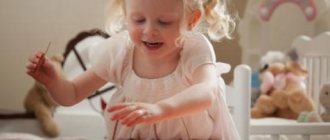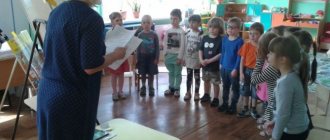Theoretical foundations for studying speech development in young children
Stages of speech development at an early age
What should be done to ensure that the child’s speech develops correctly, in time for the baby to grow into a social being?
The development of speech in a child can be divided into several stages:
Period of infant cries (0 months - 2-3 months)
The baby's first cry occurs as a component of a defensive reaction caused by the cessation of placental blood circulation and the cooling of his body in the external atmosphere. A new complex synergy of voice formation is formed before our eyes as a side consequence of the innate synergies of thermoregulation and respiration. It is important that the vocal reaction during the first respiratory factor is not enough for voice formation.
Walking period (2-3 months - 5-6 months)
Observations have shown that the baby reacts to human speech already in the first week of life and stops it by the end of the second. As soon as the baby stops crying, he carefully monitors his mother - her behavior and conversation, imprinting in his memory the leisurely and smooth movements of his hands, head and eyes, the slow pace and volume of her speech.
By 2.5-3 months of life, communication between an adult and him becomes the child’s need, so he again and again uses a set of behavioral reactions that stimulates the adult to communicate emotionally with him.
In the third month of life, the child develops a new skill - he is able to look for an adult and hint at communication. The child fixes a long, concentrated gaze on him and smiles.
In the fourth month of a child’s life, the most significant acquisition is the development of communication between him and an adult using speech sounds.
During the fifth and sixth months, changes also occur in the child’s neuropsychic development. Various speech sounds and movements that are purposeful in nature are added to the child’s proactive appeals to an adult.
During the second half of the baby's life, a business style of communication appears, in which the main role is played by his playing with objects. This communication remains the main one until about 3-4 years of age.
In the period from 6-7 to 9-10 months, the child begins to understand the speech of an adult, which radically changes his usual behavior and affects the development of movements and speech.
At 8-9 months, the baby begins to imitate many sounds unfamiliar to him. The child reacts if he hears his name and can show one of the family members. His reaction to his name is reflexively connected with the sound of words, only in this way can the child learn to understand the meaning of the word.
Period of babbling pseudowords (9-10 months - 12-14 months)
By the end of the first year of life, the baby understands the meaning of more than 10 words and can pronounce at least 5 independently. He is much better at repeating syllables and even words after his parents.
At the tenth month, the child can associate a word he hears with an object familiar to him. Such associations promote speaking, and the baby already perceives simple commands.
Speech development of a child from 1 to 3 years of age.
For the development of understanding of speech at this age stage, it is characteristic that up to 1.5 years of age, connections between objects, actions and their verbal designations develop more intensively. However, the connection between them does not immediately become stable. It is possible that the child may not answer a task correctly understood correctly.
As a child ages, the need for communication arises - he wants to show, tell or ask something. If development occurs normally, then after the first year he develops active speech and the first words appear. True, they can only be understood by a child, depending on which sounds he is able to pronounce and which he cannot.
The period when the child begins to speak
At what age does a child begin to speak? In most cases, this happens by the age of two, even if he manages to utter his first words much earlier.
At the age of 3, the child’s perception of other people’s speech improves. But in some cases, the child hears new words pronounced incorrectly from his peers. Children begin to distinguish between words that are similar in sound and sometimes differ in one sound, focusing not only on a specific situation, but also on the sound design of the word. When learning a new word, a child strives to pronounce it correctly. Children begin to use more complex words with three or more syllables, although they may not always be able to pronounce all sounds correctly.
Speech development in younger preschoolers (4-5 years old)
At the age of 4-5 years, when the child already speaks well and talks with an adult on certain topics, it becomes possible to begin cognitive communication. The child acquires a sufficient vocabulary and begins to form grammatically correct phrases and pronounce sounds normally.
In the fourth year of life, children experience improvements in pronunciation, speech becomes more understandable and distinct. Simple common sentences predominate in children's speech.
In the fifth year of life, the child shows significant progress in mental and speech development. The baby is able to identify and name the characteristics and qualities of objects (for example, size and color), establish the simplest connections and accurately reflect them in speech. His speech becomes more varied, more precise and more meaningful. Resistance to attention and the ability to calmly listen to others to the end increases.
Development of speech in older preschoolers (6-7 years old)
A child of the sixth year of life improves coherent, monologue speech. It can convey the meaning of a fairy tale, poem or a specific situation. When composing a story, he concentrates his attention on the main details, and in most cases misses the secondary ones. In the sixth year, the child’s speech is still improving, phrases become more detailed and accurate, and pronunciation is clearer.
In the seventh year, the child’s speech becomes more and more precise, detailed, and consistent. During the retelling, the child talks not only about the main events, but also touches on everything that he himself read about. He is able to accurately describe a toy or picture, and answer questions posed by the parent after reading fairy tales.
Conclusion on chapter 2
The most effective method of developing the speech of a young child is his participation in various types of activities.
Productive activities (appliqué, modeling, drawing) form a child’s idea of the shape, color or properties of a particular object. During the lessons, the child develops imagination, fine motor skills and, most importantly, speech activity. The child discovers a lot of new things and wants to know about everything, this is how the child’s dialogue with an adult or teacher is formed.
Playful activities allow the child to improve not only the coordination of movements while playing with objects, but also the quality and quantity of words in his active vocabulary, as the child gives a name to the object/toy, comes up with a situation in which he is and explains his actions. Thus, we can say that play is a fruitful way to develop speech in children.
All the methods we propose contribute to the development and improvement of the child’s speech, and also help prevent its delay.
Ways to develop speech in young children
Game activity as a means of speech development
Play is of great importance in the development of speech in young children. They love to play short outdoor games that help develop their speech. The more children enjoy the game, the more effective the result will be.
Play develops language, and language organizes play. The word is part of reality for the child. It is very important to properly organize the play environment, combining the interests of children and objects that will help in the development of speech.
Passive vocabulary is words the meaning of which a child understands, but does not speak due to age or due to delayed speech development. Children pronounce words and sounds as they hear them.
Games and exercises for developing passive vocabulary:
- "Errands." Choose a toy that is in front of the child and ask him to perform some action with it. For example, brush a doll’s hair, feed a teddy bear.
- "Do It". Ask your baby to clap his hands, jump, squat, spin, raise his arms up, close his eyes, open his mouth, etc.
Speech games aimed at developing vocabulary:
- "Balls and cubes." Offer to match items by color and place them in baskets. It is necessary to mark the color on the basket.
- "Big small". It is suggested to put large cubes and large balls in a large basket, and small ones in a small one.
- "Wonderful bag." Consider toys with your child: cubes, balls, be sure to pronounce their shape, and then hide them in a bag. Then the child must determine the shape of the object by touch and pull it out.
Speech development with the help of fiction
Fiction has a huge impact on the development and enrichment of a child’s speech.
A child’s first acquaintance with fiction begins with nursery rhymes and songs, then he listens to folk tales. A journey into the world of a fairy tale develops the imagination of children, and encourages them to write.
The book is considered as a means of developing children's speech and improving its content. She provides the child with mental and moral education.
Poetry
As you know, the easiest and most effective way to teach a child is through play. This is also true for situations where you need to practice the correct pronunciation of sounds. An interesting author’s technique for developing pronunciation and preparing a child for reading is described HERE: “Interesting games for 3-year-old children”
Speech therapy rhymes are a great way to practice if your child is unable to pronounce a particular sound. You can start learning these poems as early as 2–3 years old.





